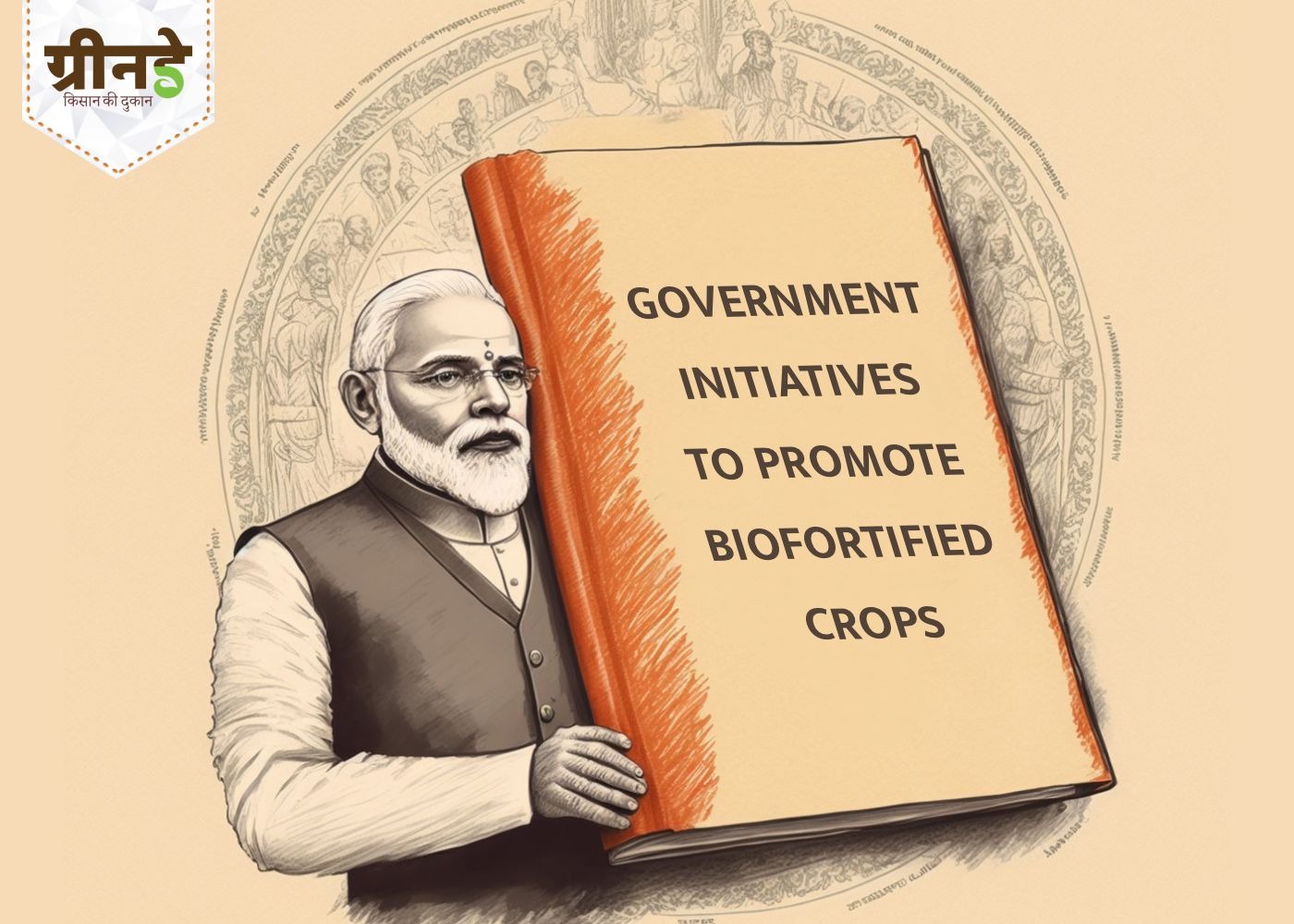Government Initiatives To Promote Biofortified Crops In India
India, a country with a vast population and diverse dietary needs, faces the challenge of addressing malnutrition and micronutrient deficiencies. One solution that has emerged as a promising strategy is biofortification – the process of increasing the nutrient content of staple food crops through breeding or biotechnology. In recent years, the Indian government has implemented various initiatives and policies to promote biofortified crops, which could ultimately help improve the nutritional status of the country.
The Need for Biofortification in India: :
India faces a significant burden of malnutrition and micronutrient deficiencies, particularly among children and women. Deficiencies in essential micronutrients such as iron, zinc, and vitamin A can lead to anemia, impaired cognitive development, and weakened immune systems.

Biofortified crops provide a sustainable, cost-effective solution to address these nutritional challenges, as they do not require any change in the dietary habits of the population.
National Food Security Mission (NFSM):
Launched in 2007, the National Food Security Mission aims to increase the production of food grains, including wheat, rice, and pulses. One of the primary objectives of the NFSM is to promote the cultivation of high-yielding, nutrient-rich varieties of crops. The mission encourages the development and distribution of biofortified seeds to farmers, contributing to the larger goal of improving food security and nutrition in India.
Indian Council of Agricultural Research (ICAR) Initiatives:
The Indian Council of Agricultural Research (ICAR) has played a crucial role in the development of biofortified crops in India. ICAR, through its various research institutes, has released several biofortified crop varieties rich in micronutrients such as iron, zinc, and beta-carotene. Some notable examples include zinc and iron-rich rice varieties (DRR Dhan 45, CR Dhan 310), vitamin A-rich sweet potatoes (Bhu Sona), and high-zinc wheat (WB 02). These crops have the potential to significantly impact the nutrition levels of the population.
Krishi Vigyan Kendras (KVKs):
Krishi Vigyan Kendras, established by the ICAR, serve as knowledge and resource centres for agricultural technologies. These centres play a vital role in promoting biofortified crops by conducting training programs, on-farm trials, and demonstrations for farmers. By equipping farmers with the knowledge and skills required to cultivate biofortified crops, KVKs contribute to the widespread adoption of these nutrient-dense varieties.
Rashtriya Krishi Vikas Yojana (RKVY):
The Rashtriya Krishi Vikas Yojana is a government initiative aimed at promoting agricultural growth by providing financial support to state governments for the implementation of agricultural development plans. This scheme has been instrumental in promoting biofortified crops by funding research, development, and dissemination activities. States can utilize the funds allocated under RKVY to develop infrastructure, train farmers, and implement awareness campaigns on the benefits of biofortified crops.
Mid-Day Meal Scheme (MDMS): :
The Mid-Day Meal Scheme, a flagship program of the Indian government, aims to improve the nutritional status of school-going children by providing hot cooked meals. Integrating biofortified crops into the MDMS can significantly enhance the micronutrient content of these meals. In 2018, the Government of Odisha introduced iron-fortified rice in mid-day meals in 8 districts, showcasing the potential of using biofortified crops to improve child nutrition.
Public Distribution System (PDS):
The Public Distribution System is a crucial mechanism for ensuring food security in India. Incorporating biofortified crops into the PDS has the potential to make a considerable impact on the nutritional status of the population, especially those living below the poverty line. By replacing conventional crop varieties with nutrient-rich biofortified ones, the government can ensure that the most vulnerable segments of society have access to essential micronutrients.
Awareness and Outreach Programs:
To promote the adoption of biofortified crops, it is essential to create awareness about their benefits among farmers and consumers. The Indian government, in collaboration with non-governmental organizations, has launched various outreach programs to educate farmers on cultivation techniques, the nutritional value of biofortified crops, and their role in addressing micronutrient deficiencies. Furthermore, consumer awareness campaigns emphasize the health benefits of consuming biofortified crops, ultimately driving demand and encouraging farmers to grow these nutrient-rich varieties.
Collaboration with International Organizations:
The Indian government has partnered with international organizations like HarvestPlus, the International Rice Research Institute (IRRI), and the International Crops Research Institute for the Semi-Arid Tropics (ICRISAT) to develop and promote biofortified crops. These collaborations facilitate knowledge exchange, technology transfer, and funding for research and development of biofortified crop varieties tailored for the Indian context.
Challenges and the Way Forward:
While significant progress has been made in promoting biofortified crops in India, certain challenges persist. Limited availability of high-quality seeds, inadequate infrastructure for seed production and distribution, and lack of awareness among farmers and consumers are some of the barriers that need to be addressed. Strengthening public-private partnerships, increasing investments in research and development, and conducting targeted awareness campaigns can help overcome these challenges.
Biofortification offers a promising approach to combat malnutrition and micronutrient deficiencies in India. The Indian government's various initiatives, policies, and collaborations have laid the foundation for promoting biofortified crops across the country. By addressing the existing challenges and capitalizing on the potential of biofortification, India can take a significant step towards ensuring better nutrition and overall health for its population.